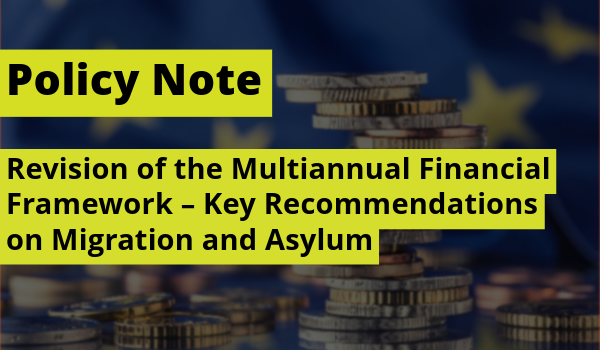This week, ECRE and PICUM have published a joint policy note on the proposed revision of the Multiannual Financial Framework (MFF) for the period 2021 – 2027, with key recommendations on migration and asylum and an overview table.
In June 2023, the European Commission proposed an increase of Member States’ contributions to the long-term EU budget. The proposal suggests an increase of approximately 65.8 billion euros in the EU budget for the period 2021 – 2027, by topping-up existing programmes and by setting up two new special instruments (including one on Ukraine’s reconstruction). Through the revision, “migration and external challenges” would receive an additional 15 billion euros increase broken down as follows: 2 billion euros for the implementation of internal migration policy, and 13 billion euros for external and humanitarian aid policies with a strong displacement focus. The proposal also opens to the possibility of recommitting cohesion policy funds to a new objective for “strategic technologies”.
The policy note highlights that Heading 2 of the MFF “Cohesion, resilience and values” is the only programme not benefitting from a budgetary increase during the revision, despite the rise of poverty levels in Europe. The note recommends that, as a minimum, these resources should not be diverted to other priorities, and the Member States should carefully reassess their cohesion spending for the implementation of social inclusion targets. This includes commitments on the Child Guarantee initiative, and on material deprivation and social exclusion through the European Social Fund +.
On internal migration policy, the note finds that the primary objective of the new resources under Heading 4 “Migration and border management” seems to be the implementation of selected elements of the Pact. This includes in particular “the screening and border procedure, reception capacity, relocations, and returns”, with the risk of using resources for increased border management and detention at EU borders. The policy note stresses that additional resources are positive if used to tackle primary implementation gaps of the Common European Asylum System (and related elements of the Pact, if approved) in the areas of inclusion, reception conditions, housing, access to services, and procedural guarantees.
Finally, on external policy, the policy note focuses on the 10.5 billion euros increase within Heading 6 “Neighbourhood and the World”. It finds that while the reform allocates resources to support Syrian refugees in Lebanon, Jordan, Turkiye, and Syria itself (5.2 billion euros), there is also a concerning focus on migration control objectives within external funding. This concern is particularly relevant regarding the proposed 2 billion euros for the Western Balkans, and 0.3 billion euros to be dedicated to the “Southern migration route” or 3 billion euros to replenish the NDICI Cushion. The note underlines the risk that these resources are used for implementing migration agreements and Action plans focusing on outsourcing migration responsibilities to third countries, returns, and tightened border controls, by undermining coherence of development funding.
The policy note aims at contributing to the debate surrounding the MFF revision from the perspective of civil society organisations actively working on migration and asylum.
For further information:

